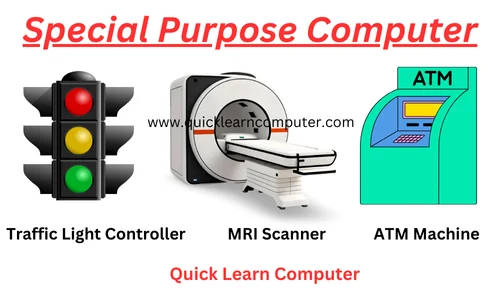In today’s technologically advanced world, computers are designed to meet diverse needs. Among them, a special purpose computer plays a crucial role in performing dedicated tasks efficiently.
Unlike general purpose computers, these machines are tailored for specific applications, offering optimized performance in fields such as healthcare, defense, industrial automation, and embedded systems.
This article explores what is a special purpose computer, its types, features, uses, and real-world examples. Whether you are a student, tech enthusiast, or professional, this guide will give you a comprehensive understanding of the topic.
What is Special Purpose Computer?
A special purpose computer is a computing device designed to perform a specific task or set of tasks. It is not intended for general use like web browsing, gaming, or word processing. Instead, these computers are engineered to handle specific operations with high efficiency and reliability.

Key Special Purpose Computer Characteristics:
Examples of Special Purpose Computers
To better understand their functionality, let’s look at real-world examples.
Notable Examples:
- GPS Navigation Device: Designed solely for route mapping and location tracking.
- ATM Machine: Tailored for financial transactions.
- MRI Scanner: Used for medical imaging with high accuracy.
- Traffic Light Controller: Manages traffic signals efficiently.
Each of these devices has embedded computing systems that perform only one or a few closely related tasks.
Types of Special Purpose Computers
Special purpose computers come in various types, depending on their application domain. Below are the major types:
1. Embedded Systems
These are microprocessor-based systems built into devices to control specific functions.
Examples:
- Washing machines.
- Microwave ovens.
- Digital cameras.
2. Control Systems
Used in industries for controlling machinery and processes.
Examples:
- PLCs (Programmable Logic Controllers).
- CNC machines.
3. Real-time Systems
Designed to process data and deliver outputs in a strict time frame.
Examples:
- Air traffic control systems.
- Missile guidance systems.
4. Signal Processing Computers
Used for manipulating signals such as audio, video, or radar.
Examples:
- Radar systems.
- Medical imaging devices (like MRI).
Features of Special Purpose Computers
These computers are uniquely equipped with specific attributes that make them ideal for specialized operations.
Notable Features:
- Compact Design: Often embedded in small devices.
- Power Efficiency: Uses minimal power for specific tasks.
- Speed and Accuracy: Optimized for rapid processing.
- Durability: Designed for use in challenging environments.
- Low Maintenance: Requires less frequent updates or servicing.
- Internet of Things (IoT): More smart devices requiring embedded systems.
- AI Integration: Custom AI chips for image recognition, speech processing, etc.
- Healthcare Innovations: More reliable diagnostic and monitoring devices.
These trends point to a growing demand for highly specialized computing hardware.
Uses of Special Purpose Computers
Special purpose computers are integral to various industries due to their focused performance.
Common Computer Applications:
- Healthcare: In devices like pacemakers, CT scanners, and infusion pumps.
- Automotive: For engine control units and navigation systems.
- Defense and Aerospace: Used in drones, satellites, and radar systems.
- Manufacturing: For automation and robotic control systems.
- Consumer Electronics: Found in gaming consoles, smart TVs, and more.
Advantages of Special Purpose Computers
Special purpose computers offer several benefits, particularly in terms of efficiency and reliability.
Key Advantages:
- High Performance: Executes tasks faster than general-purpose computers for specific functions.
- Energy Efficient: Consumes less power due to optimized design.
- Compact and Lightweight: Ideal for embedded applications.
- Reliable Operation: Low failure rate when performing the designated task.
Disadvantages of Special Purpose Computers
Despite their advantages, special purpose computers also have certain limitations.
Key Disadvantages:
- Lack of Flexibility: Cannot be used for tasks beyond their design.
- Costly to Develop: Custom design and production can be expensive.
- Difficult to Upgrade: Hardware and software are often tightly integrated.
- Limited Lifespan: Becomes obsolete if the specific function is no longer needed.
Special Purpose Computer vs General Purpose Computer
It’s essential to distinguish between special purpose and general-purpose computers.
| Feature | Special Purpose Computer | General Purpose Computer |
|---|---|---|
| Functionality | Performs specific tasks | Can perform a wide range of tasks |
| Flexibility | Low | High |
| Cost | Often higher per unit | Lower per unit (mass production) |
| Examples | ATM, MRI, GPS | Desktop PC, Laptop, Tablet |
| Performance | Optimized for task | Balanced for versatility |
FAQS
1. What is a special purpose computer with example?
A special purpose computer is a computing device designed to perform a specific task. Example: An ATM machine is a special purpose computer used exclusively for financial transactions.
2. How is a special purpose computer different from a general purpose computer?
A special purpose computer is designed for one task (e.g., GPS device), while a general purpose computer (e.g., laptop) can perform multiple functions such as browsing, writing, or gaming.
3. Where are special purpose computers used?
They are used in medical devices, automated industrial systems, navigation systems, home appliances, and military applications.
4. Can special purpose computers be reprogrammed?
Generally, they are not meant to be reprogrammed, as they are built for fixed tasks. However, some embedded systems may allow firmware updates.
5. Can you upgrade a special purpose computer?
Most special purpose computers are not upgradeable in the traditional sense. Their hardware and software are tightly integrated for one function, though some may allow firmware updates.
Conclusion
A special purpose computer is a vital part of modern computing infrastructure, built to carry out dedicated tasks with unmatched efficiency.
From medical devices to industrial machines, these systems are everywhere—often working behind the scenes to make our lives safer, smarter, and more convenient.
Understanding what is special purpose computer, its features, types, and real-world applications helps appreciate its value in the digital ecosystem.
While they may not offer the flexibility of general-purpose computers, their precision, reliability, and optimization make them indispensable in many fields.